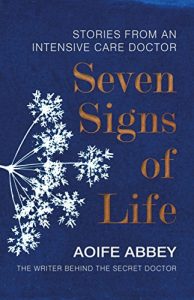 Aoife Abbey is an ‘intensivist’. At one level this means a doctor in intensive care, responsible for patients in extremis, often sedated and ventilated, and sometimes never conscious of the people caring for them. So it might seem strange that Abbey focuses her memoir not on the bodily functions that are essential for life – provided by heart, lungs, kidneys and so on – but on emotions and sensory perception: fear, grief, joy, distraction, anger, disgust, hope. But on another level this is natural, for she is a doctor who feels things intensely, and thinks profoundly about her interactions with patients and their relatives.
Aoife Abbey is an ‘intensivist’. At one level this means a doctor in intensive care, responsible for patients in extremis, often sedated and ventilated, and sometimes never conscious of the people caring for them. So it might seem strange that Abbey focuses her memoir not on the bodily functions that are essential for life – provided by heart, lungs, kidneys and so on – but on emotions and sensory perception: fear, grief, joy, distraction, anger, disgust, hope. But on another level this is natural, for she is a doctor who feels things intensely, and thinks profoundly about her interactions with patients and their relatives.
Seven Signs of Life has a subtitle relating to Abbey’s role as an intensive care doctor, but that is misleading. This volume has profound relevance to all health care professionals. Many of us work in areas which do not see life and death situations with the same frequency as ICU or A&E or Resus, but we all meet situations that arouse these feelings – fear, grief, joy, distraction, anger, disgust and hope – whether in ourselves, in our patients or in their loved ones. What is more, these are the features that make us human. Abbey strikes a wonderful balance between retelling interesting encounters and pondering their significance.
Abbey fights for the ‘small stuff’ – partly as a result of the attitudes and treatment shown to her older brother, who had easily noticed disabilities. For her, language is important, because during times of crisis patients and their families hang on every word. One example: ‘withdrawal of care’ is not the same as ‘withdrawal of active treatment’, since the former implies a lack a caring that is neither true nor right.
I found the discussion of ‘hope’ particularly stimulating. Abbey is remarkably honest about how doctors and health staff are just as prone as the patients and relatives to allowing their expectations to be swayed, even with a knowledge of the odds, and of previous cases. On the one hand, emotionally we would like the positive outcome, whatever the probabilities. On the other hand doctors are very wary of giving people unjustified expectations – a spark that could kindle a blaze that may well have to be extinguished. The mental calculations involved in Abbey’s many talks with relatives are explored, and through this many-dimensioned exploration the reader comes to appreciate their need for hope, and the ambivalent power of hope in recovery and rehabilitation.
This is a wonderful and moving discussion of the emotional life of doctoring and health-care, both the emotional costs and the life-giving benefits. It is one of the best of several medical memoirs to have been published recently, with points of interest for anyone involved in caring. Highly recommended.
Abbey, Aoife (2019) Seven Signs of Life: Stories from an Intensive Care Doctor, London, Penguin Random House.